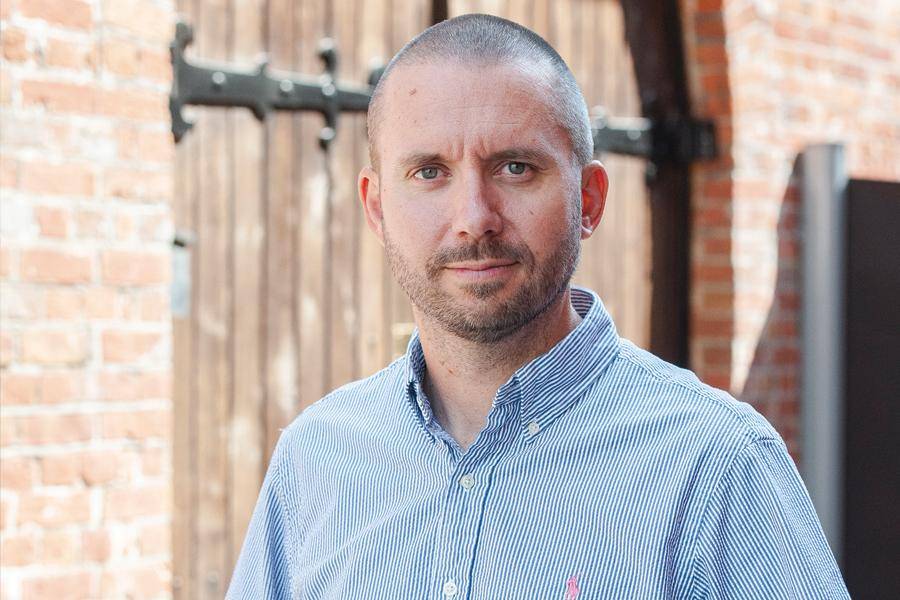Operating out of Eastleigh in Hampshire, Global Ceramic began life in the year 2000, set up by a tiler and a surveyor with just six employees.
While that may be a relatively brief time span in comparison to some of its peers, While that may be a relatively brief time span in comparison to some of its peers, it means the company’s director, Jason Oliver, has been with Global throughout its entire existence. With a “few bumps here and there” across his 22 years leading the business, Oliver has learned plenty of lessons – and he was kind enough to share some of that experience with TSJ in a recent conversation.
OOne key piece of wisdom Oliver has internalised over the past two decades is to work efficiently. For Global Ceramics, that means working locally. “We stay out of London,” Oliver explains. “That’s not where we want to be. Years ago, you could drive into London and work and get home, but it doesn’t really work that way now.” This isn’t to say, of course, that Global doesn’t get around. Within the Southeast area, the contractor covers Hampshire, Dorset, Wiltshire, Berkshire, Surrey and East Sussex. Even then though, Oliver occasionally finds himself driving past projects on his way to Global’s current job, wondering: “Well, why couldn’t we be doing them?”
That focus on efficiency is carried through to the types of jobs Global takes on too. “We do newbuild housing and we do commercial work,” Oliver says. “Newbuild housing has historically been about 60% of our turnover, with commercial making up the remainder.” The fast-paced world of newbuild housing “can be a bit manic at times” but the flow of work is equally swift, making these high-pressure jobs a worthwhile investment of time and energy. “Housebuilders understand how it works, there are homeowners moving in and they want to get the money from them. That’s why they want to get the plots done, get the jobs finished.”
Ensuring the fast turnaround times are met on these complex, multiple plot jobs is a challenge of not just tiling proficiency, but organisation. Oliver explains that “housing takes a lot more management time because every plot is a different tile choice from our point of view. If there are 100 plots on a site, although they might only have 20 tiles, they’re all selecting their own.” To manage this, Global employs 11 office-based staff, including two contract managers, to support the tilers on-site. Even through the most challenging jobs, Oliver says with some pride “the guys we’ve had doing them have always pulled together and we’ve gotten out of it in the end”.
Even within this fast-paced environment though, there are some jobs that allow for a little more flexibility with scheduling, Oliver says. These properties allow Global’s installers to truly showcase their skills, with beautiful high-end results. “We’ve done a few really nice one-off houses, which were quite fulfilling. The difference between a one-off bespoke property or a three or four house development and a national housebuilder, is they’ve got the time and money to get it right, and they’ve got the money to spend on the products as well. All that together makes for a nice job.”
Oliver notes that payment is “reasonably” prompt when it comes to housebuilders, but the process nonetheless requires active management. “I think the key is making sure you’ve got it agreed at the beginning what your payment terms are and making sure you stay on top of it,” he says. “That’s one thing I’ve learned over the last 22 years of doing this: you’ve got to stay on top of chasing the money. Because as soon as you stop chasing it, you go to the bottom of the pile.”
There are some areas where pure efficiency has to take a back seat though, particularly when thinking about the long-term future of the industry, as well as the planet. “Our biggest problem has always been and likely will always be skilled labour,” Oliver says, highlighting an issue facing the entire construction sector. He’s not certain why it’s so difficult right now, but he suspects it may be a consequence of the ageing workforce, combined with a lack of interest from young people. “They look at it as a tough path, and unfortunately some of them want to run before they can walk. They don’t understand that they’ve got to come in and earn apprentice wages for a bit.”
Despite this, Global is “trying to do [its] bit”. The company is currently training four apprentices and has consistently taken them on throughout almost it’s entire existence. Oliver’s initial experience with apprentices was “very good,” having taken on the company’s first in November 2001. “He still works with us,” Oliver reveals with pride. “That’s an amazing success.” There were a few more after that who worked with Global for a very long time, eventually leaving the company for various personal reasons.
Over time, however, it’s become harder to get apprentices, and harder still to keep them! “There’s possibly more opportunity out there for youngsters nowadays,” Oliver suggests. “We need to find a way of getting that into schools, getting the message across that this job’s here.” Global maintains a good relationship with the college its apprentices attend. Oliver has spoken at the college to the students who are on the full-time course, which he says has always been a positive experience, but he worries this approach won’t solve the underlying issue that younger people simply don’t know about tiling as a career. “Maybe we need to go into the next level down into the schools and speak to the kids there.”
More pressing than this though, is the issue of funding. Put simply, apprentices are expensive. “You can’t become a skilled tradesperson in a year, which means apprentices are costing you a lot of money over the 2-3 years you’re trying to train them, and some companies can’t sustain that. We couldn’t take any more on right now, it’s costing us a lot of money with the four we have on now.” Whether it’s a change in wage laws or an increase in support from government, Oliver argues, something has to change if the industry is to keep pace with the demand for skilled labour. After all, Global can do its part, but as Oliver says: “There are companies smaller than us out there who must be looking at the situation and saying: what do we do now? We can’t afford this.”
Perhaps more important still, Global does everything in its power to reduce the environmental impact of the work it does. Oliver admits this is mediated heavily by the architects and developers who specify jobs in the first place, as product selection is the first step in sustainable building design, however Global is still able to make a difference in some key areas. “We do have a little initiative,” Oliver says. The company makes sure to recycle the pallets its tiles are delivered on, most of which would otherwise find its way to landfill, and this is part of an overall effort Global makes to reduce wastage on site.
“From a cost point of view as much as the environment we need to keep wastage down to a minimum,” Oliver points out.
And now, perhaps more than ever, companies have to keep a keen eye on their bottom line. “Everything’s going up: costs of the business, electricity for the office, fuel for the vans. Everything’s going up except our prices – we can’t raise our prices up any higher or we just won’t win the work.” Despite these pressures, Oliver’s experience over the past 22 years has given him plenty of perspective on just how resilient the company can be. “In the grand scheme of our lives, it’s going to be a small part. If you’ve got a bumpy ride for a year or two, it’s not the end of the world. It was quite bumpy during the recession of 2008-2011, for example. It’s not so easy in the moment, but when you look back you say: we got through it, and we’ve come out stronger”.
Ultimately, he says, companies can only make smart decisions, work hard and “try not to worry about things we can’t control”. Beyond that, Global Ceramic’s goal is a simple, but admirable one. “We’re not perfect, none of us are, but I’d like to think we’re a decent company. I’ve got some people who work with me and have been here since day one, some people who’ve been here 22 years, a few people who’ve been here 10-12 years. We try and do our bit for charity: we’ve had people do marathons, Tough Mudder, in lockdown we did a 2020 challenge to raise money for our local children’s cancer ward. We also recycle as many of our pallets as possible with all proceeds also going to charity. It’s not just about sticking tiles on the walls, it’s about doing the right thing for our staff, our clients and our community.”
www.globalceramics.co.uk








